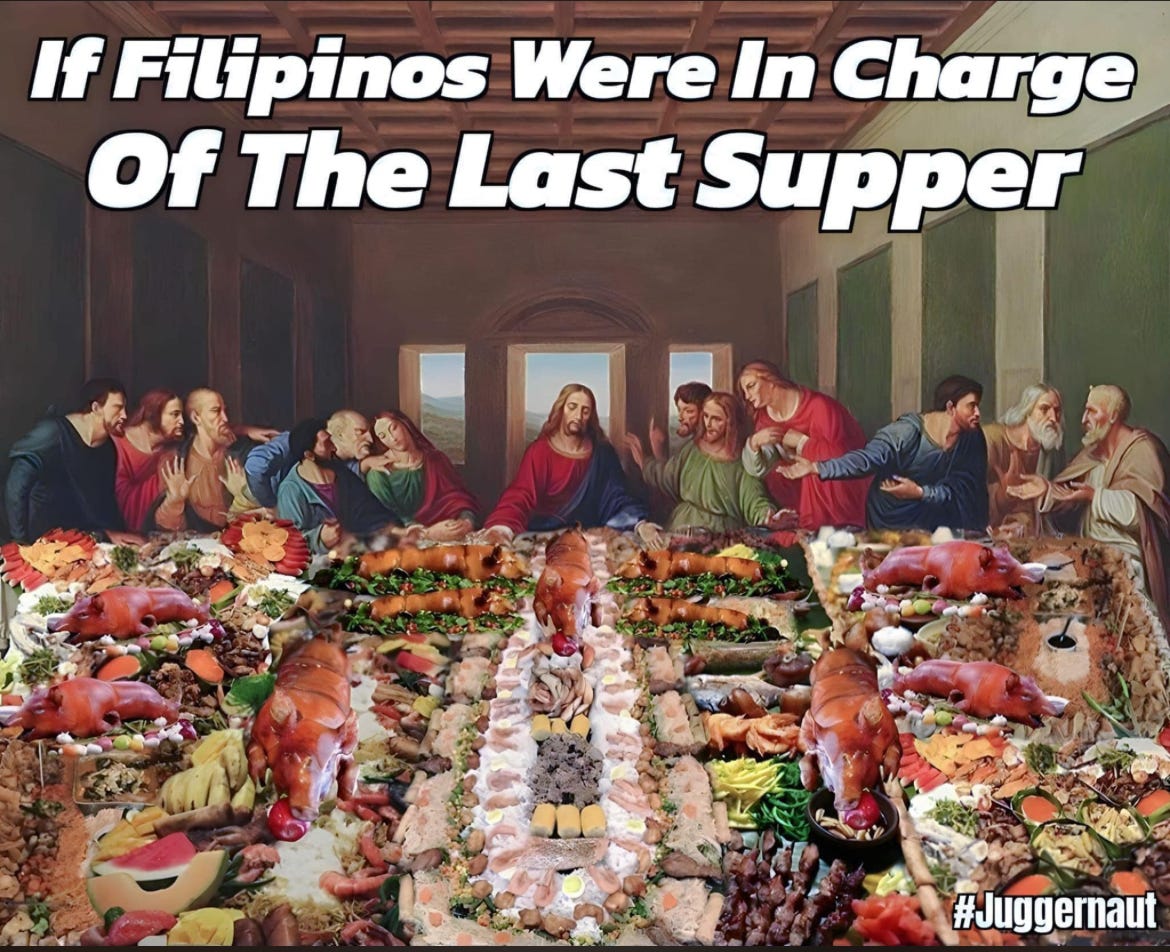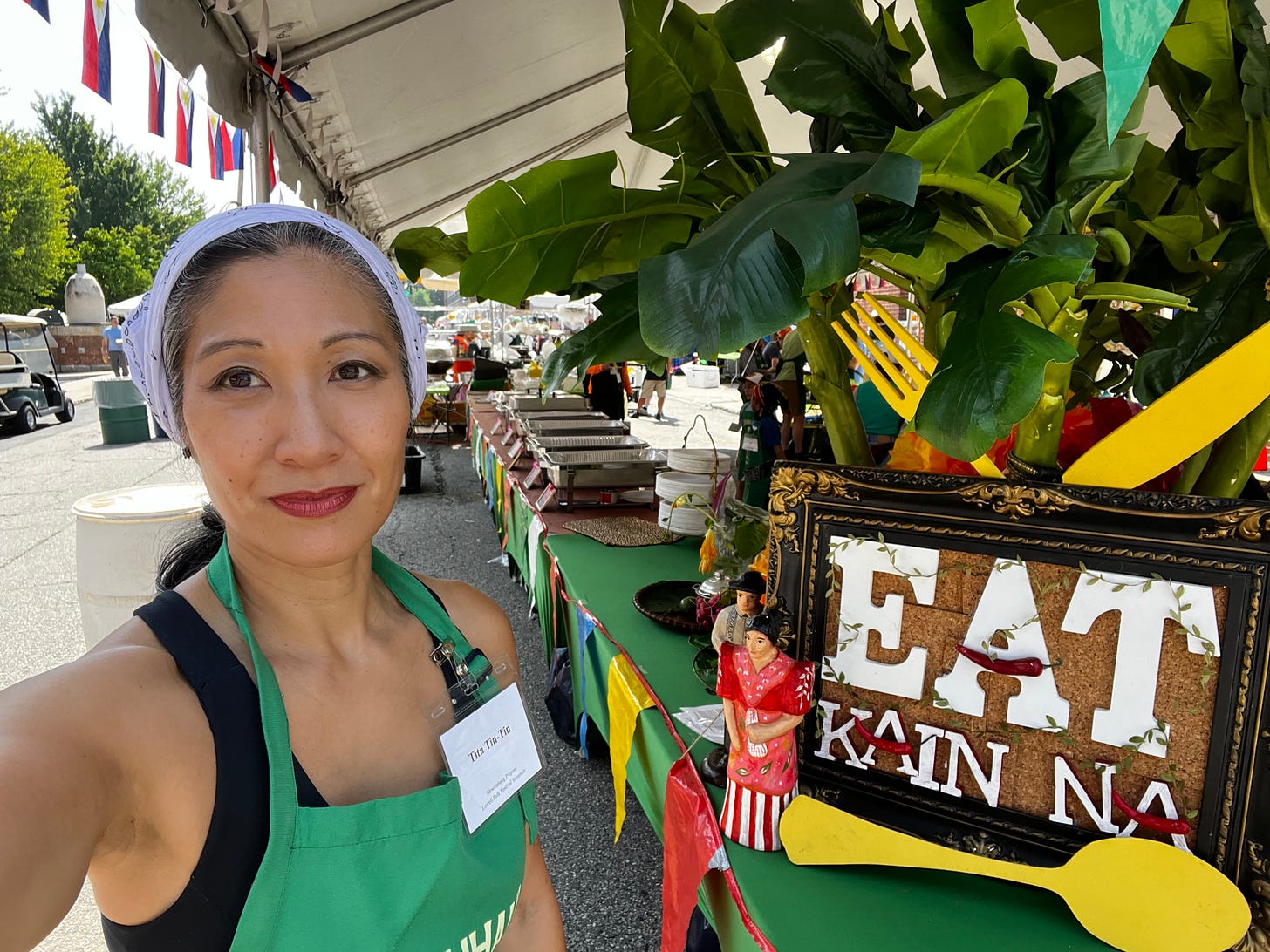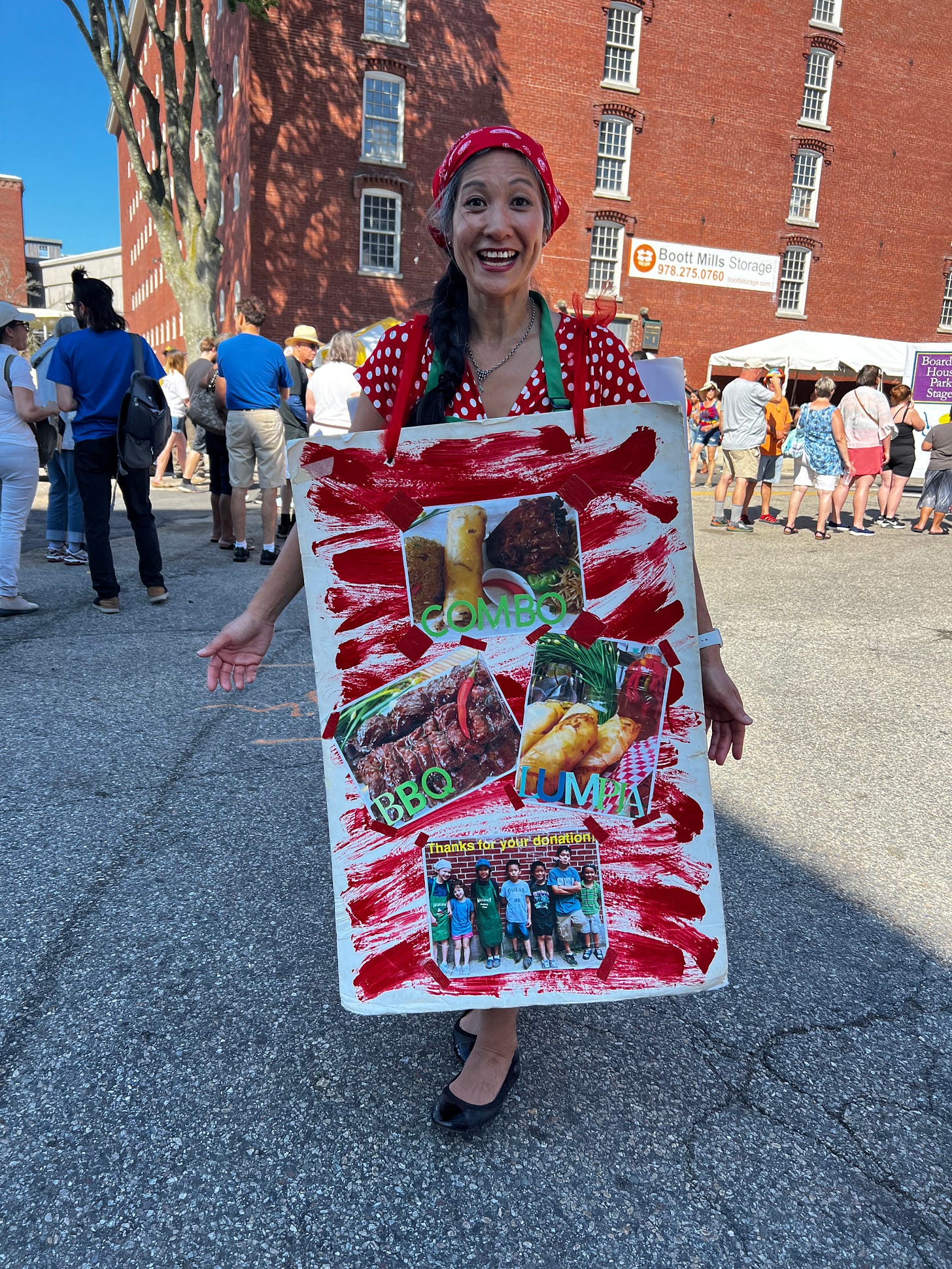Nourishing Souls One Turon at a Time
On Filipino food at the Lowell Folk Festival, Aristotle’s De Anima, and Capon’s The Supper of the Lamb. Plus: Plato and Joseph Pieper.
Hello, everyone! A number of you are very new to this Substack, and I am so happy you are here. I write a mixture of posts—some are more academic than others. Those of you who are not new will notice that my publishing pace has been off. Promised essays on the Jane Austen and women in the arts, various book reviews, and the re-start of my Shakespeare project are forthcoming. Life has been hectic—even more this summer than others it seems. We had a failed vacation attempt that ended in a week-long staycation, two cars that needed emergency repair, camp for the youngest two kids, summer programming for the oldest two, and a new summer job for the middle child.
I’ve been so busy that it seems like I’ve totally missed out on the latest outrages—to which I can only respond with funnies I pull from Reddit.
The Lowell Folk Festival
Subscribers who saw my latest Substack Chat1 know that I spent last weekend volunteering at the Lowell Folk Festival. My kids’ Filipino school, Iskwelahang Pilipino, hosts an extremely popular food booth every year to raise funds for our rent and more.

The Lowell Folk Festival is the nation’s largest FREE music festival of its kind. There are many vendors, but our booth always has the longest line. We’ve had customers who come to our tent year after year. In Filipino, these “regulars” are called suki, which comes from the Hokkien Chinese phrase "tsu kheh" which means "primary guest".

Every year we have parents and students all working together, and it was great for the crowd to see the effort that the kids and teens put into making the food on site, serving the plates, giving out free samples, and working the cash register.
Sharing one’s cuisine is a particularly effective way of spreading culture. Taste and smell become memory: the smoke of the barbecue, the crisp first bite of a fresh lumpia, and the sweet pickle vinegar of the atsara. Meals that are this complex and with so many ingredients are not meant for just one person to make. It takes a community to prepare the meal and a community forms to partake in it.
For our school, the three days in Lowell are not just a fundraiser but a bonding experience. A yearly tradition that takes months of planning, an investment of time and resources, and a willingness to teach a young people how to cook food from the homeland. It is an intergenerational experience, and it has become something culturally significant for our school. It promotes values, like hard work, creativity and generosity, that our parents want to instill in the kids so that these virtues are passed on to their grandchildren.
Culture is an instrument of generational memory. Festivals, like the one in Lowell, MA, are particularly effective at bringing people to share what a community thinks is culturally significant. Music and art. Food and fellowship.
Aristotle’s De Anima
Another aspect of culture I have been fully immersed in is more academic. Many of you know I have been doing autodidactic deep dives into classical Greek and Roman philosophy, language and art. I am a huge fan of
and . Right now I am neck deep in Aristotle (whom you can read up on over here at CW).I have been doing a close reading of Aristotle’s De Anima (On the Soul) with a small group at The Catherine Project. (
recently mentioned the organization in a comment or note regarding his posts on 12-Month Immersive Course in Humanities and How to Read Plato.) The Catherine Project is a non-profit that offers an accessible education in the Great Books and other culturally significant works. All courses are free and led by volunteers.From their website:
The Catherine Project was founded on the principle that learning for its own sake is crucial for human flourishing and ought to be offered at a high level to anyone who seeks it out seriously and sincerely. No one’s inability to pay should be an obstacle to their opportunities to learn.
This is my second Aristotle course, and it is fascinating to see how we are all interpreting this reading this semester. I am especially interested in hearing the comments from the two Catholic priests in our group because as modern readers we need to take a step back from our current understanding and try to see things as a philosopher in mid-300 BCE would.
Aristotle viewed the soul as “the first actualization of a natural body that has life potentiality”2 and defined by its capacities of nourishment, perception, thought, and movement.3 He understood the soul “belongs to a body” and cannot exist without a body nor is it a body itself. The capacity of nourishment is an interesting one because it is associated with appetite, and he associates appetite with desire. From Book 2, Chapter 3,
[All] animals have at least one sort of perception, namely touch; but for what has perception there is also pleasure and pain and the pleasant as well as the painful; and where there are these, there is also appetite, since it is desire for the pleasant.4
A question:
Is the act of eating not just for the body but also a necessary exercise for the soul?
Robert Farrar Capon’s The Supper of the Lamb
Not long ago, one of my friends,
, had a Facebook group where she was cooking through the recipes from The Supper of the Lamb , a cookbook written by Robert Farrar Capon, an American Episcopal priest and amateur chef.The book revolves around the concept of how to serve “LAMB FOR EIGHT PERSONS FOUR TIMES” and, yes, there are recipes but there are also generous helpings of theology, philosophy, and humor as well.
Just to give you an example, we have a few parts that look like this:

In fact, The Supper of the Lamb doesn’t look like a traditional cookbook until about two-thirds deep into the book. Until then Capon tends to wax poetical, being as much in love with language as he is with cuisine. In Chapter 4: The Generous Ox, he writes,
Language is no utilitarian abstraction; English, French, Greek, and Latin are concrete delights, relishing by which the flavor of words and syntax are rolled over the tongue. And so in their own way are all the declensions and conjugations of beef, lamb, pork, and veal. Food is the daily sacrament of unnecessary goodness, ordained for the continual remembrance that the world will always be more delicious than it is useful. Necessity is the mother only of clichés. It takes playfulness to make poetry.
He calls himself an amateur—a word whose origins stem from the late 18th century French, from Italian amatore, from Latin amator ‘lover’, from amare ‘to love’. He says, in the very first chapter:
The world may or may not need another cookbook, but it needs all the lovers—amateurs—it can get.
The reason why I bring up Capon after Aristotle is because of this particular passage:
Man invented cooking before he thought of nutrition. To be sure, food keeps us alive, but that is only its smallest and most temporary work. Its eternal purpose is to furnish our sensibilities against the day when we shall sit down at the heavenly banquet and see how gracious the Lord is. Nourishment is necessary only after a while; what we shall need forever is taste.5
Capon’s function of nourishment is interesting here since he sees it as more of a bodily activity, and he distinguishes it from taste—which I understand because he spends the book talking about issues of desire and pleasure. And this desire is more than a carnal one for Capon. It is a divine longing, in the sense of St. Augustine who said in his Confessions, You have made us for yourself, O Lord, and our hearts are restless until they rest in You. Thus in reading Capon it is easy to see appetite and bodily hunger as a metaphor for the insatiable longing for God. A truly delicious meal is a thing of Beauty. Indeed cooking is an Art—something that requires a degree of knowledge and skill—that goes into the creation of the supper as he describes it.
But not only that, he spends a chapter talking about how to host a dinner party, which is something one does not usually see in a cookbook, but its inclusion speaks that fact that The Super of the Lamb is, for all intents and purposes, a book about Communion.
A little Plato and Pieper on Feasts and Festivals
But the Gods, taking pity on mankind, born to work, laid down the succession of recurring Feasts to restore them from their fatigue, and gave them the Muses, and Apollo their leader, and Dionysus, as companions in their Feasts, so that nourishing themselves in festive companionship with the Gods, they should again stand upright and erect.
— Plato
Joseph Pieper used this quote from Plato for the epigraph of Leisure: The Basis of Culture, which longtime readers will know I read continuously and write about from time to time. In the very last part of his essay Pieper says that the soul of leisure lies in celebration and the origins of feast and festival were always in divine worship, which “of its very nature, creates a sphere of real wealth and superfluity, even in the midst of the direst material want—because sacrifice is the living heart of worship.”6
There is no utility during festivals—it is “wasted” time. A celebration is a duration sacrificed for the sake of companionship with God and each other—and thus we see the connection between the ancient Greeks and modern Christians. Feasts and festivals happen, whether you are an athlete in Paris or a music lover in Lowell. And so we must all see these as opportunities for Communion.
Taste not the bitterness of outrage.
I offer you the crispy sweetness of turon!
Kain na tayo!7
Should I have used Notes instead? Would people have preferred a full post to let people know about the Lowell Folk Festival? Let me know what I should have done things differently.
Book 2: Chapter 1 (412a27)
Book 2: Chapter 2 (413b11)
Book 2: Chapter 3 (414b1)
The Supper of the Lamb, pg 40
Leisure: The Basis of Culture, pg 59
Filipino for, “Let’s Eat!”









Zina, my heart leapt (really!) to see a reader of De Anima here! Come over and visit my Substack when you have a chance: This Won’t End Well: On Loving Greek Tragedy. And I do mean “when you have a chance.” You’re busy!
This is very good. I'm surprised Capon's book is still around. About 50 yrs. ago, I read it with beautiful friend of mine married to a psychiatrist in Vermont. I was living in the country and first met them when he was an intern at a Fargo hospital, then they moved away. Later I moved away to MPLS and returned to Catholicism. I was happy when they converted to Christianity, but they stopped at Episcopalianism. You should read the end of Capon's book closely. He is fascinating, but an unholy sensualist. His NYTimes obituary mentioned his unorthodox theology and how he lost his job as an Episcopal priest because he divorced. At the end, he writes about using baking soda for heartburn, then about a "higher distress for which the earth has no cure." He writes that splendid dinners, food, company arouse other appetites. He calls those appetites a man's thirst for being. He invites his readers to not avoid offered love. He compares a man seducing a "girl with high cheekbones" to a priestly agent, and then has the blasphemous gall to compare that kind of love to Christ's passion. "Love is the widest, choicest door into the Passion." My friend was studying art, and Capon's immoral musings weakened her while one of her professors was feeding her a similar line of BS. She decided to stay faithful only after she naively told her husband about the bogus premise of adulterous love being a way to the Kingdom, he was deeply hurt.